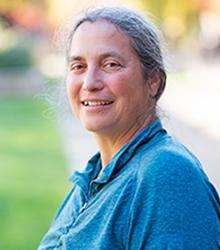
Julie Alonzo
Biography
Dr. Julie Alonzo, Research Associate Professor and Co-Director of Behavioral Research and Teaching at the University of Oregon, earned her PhD in Educational Leadership with a specialization in Learning Assessment/Systems Performance from the University of Oregon in 2007. Prior to coming to the University of Oregon, she worked for 12 years as a secondary school teacher and administrator and earned her National Board for Professional Teaching Standards certification in Adolescent and Young Adulthood English Language Arts.
Dr. Alonzo has taught a variety of graduate-level courses at the University of Oregon including Survey of Educational Research Methodology, Professional Writing, Action Research, Introduction to Research Methods, Measurement in Decision Making, Measurement and Assessment, Middle/Secondary Teacher Education Curriculum/Assessment Alignment, and Middle/Secondary Teacher Education Capstone Project. She regularly serves on grant peer review panels for the U.S. Department of Education, the National Institute of Justice, and the National Science Foundation as well as for a variety of journals and conferences focused on educational measurement and school-based interventions. She has published 18 articles in peer-reviewed journals, 8 book chapters, 118 technical reports, and has presented 57 papers at research conferences.
Dr. Alonzo is a member of the Research and Outreach Council’s Executive Leadership Group as well as a member of the College’s Task Force on CNTTF research faculty. She is a member of the Editorial Review Board for Assessment for Effective Intervention, Educational Measurement: Issues and Practice, and Journal of Educational Measurement and regularly serves on grant review panels for the U.S. Department of Education.
Education
Publications
Alonzo, J. (2016). The relation between Smarter Balanced and easyCBM Mathematics and Reading Assessments. Journal of School Administration Research and Development, 1(1), 17-35.
Sáez, L., Nese, J. F. T., Alonzo, J., & Tindal, G. (2016). Individual differences in kindergarten through grade 2 fluency relations. Learning and Individual Differences, 49, 100-109.
Basaraba, D., Yovanoff, P., Alonzo, J. & Tindal. G. (2012) Examining the structure of reading comprehension: Do literal, inferential, and evaluative comprehension truly exist? Reading and Writing: An Interdisciplinary Journal. doi: 10.1007/S11145-012-9372-9
Nese, J.F.T., Park, J., Alonzo, J., & Tindal, G. (2011). Applied curriculum-based measurement as a predictor of high-stakes assessment: Implications for researchers and teachers. Elementary School Journal, 111, 608-624.
Clarke, B., Nese, J.F.T., Alonzo, J., Smith, J.M.L., Tindal, G., Kame’enui, E.J., & Baker, S.K. (2011). Classification accuracy of easyCBM first grade mathematics measures: Findings and implications for the field. Assessment for Effective Intervention, 36, 243-255. doi: 10.1177/1534508411414153
Alonzo, J., Basaraba, D., Tindal, G., & Carriveau, R. (2009). They read, but how well do they understand? An empirical look at the nuances of comprehension.Assessment for Effective Intervention, 35, 34-44. doi: 10.1177/1534508408330082
Alonzo, J., Tindal, G., & Robinson, Q. L. (2008). Using school-wide response to intervention to close the achievement gap in reading. ERS Spectrum. 26, 1-9.
Research
In addition to serving as PI/Co-PI on numerous projects funded by the Institute of Education Sciences and the Office of Special Education Programs, Dr. Alonzo is the lead author of the easyCBM online learning system, used extensively by school districts across the world (over 81,000 teachers and 1.1 million students in the past year alone). Her research focuses on teacher professional development, Response to Intervention (RTI), the development of technically-adequate assessments for screening and progress monitoring, and the meaningful inclusion of students with diverse learning needs.
